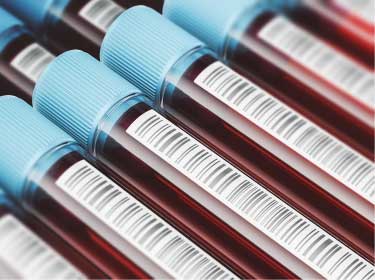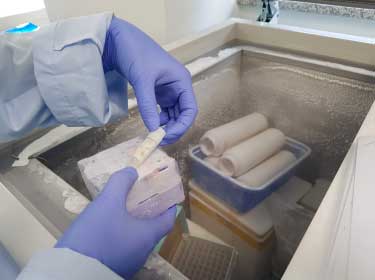Written by Roshini Beenukumar, PhD
One of the reasons for the poor reproducibility of research findings is poor sample integrity. Biospecimen quality could decline over time, particularly when exposed to thawing conditions. There aren’t any reliable tests to assess if and how long samples remain in such compromising conditions. In a study led by Prof. Dr. Chad Borges, assistant professor at the Arizona State University, researchers identified a novel biomarker that can assess the integrity of stored blood serum and plasma samples.
The long-standing issue of research reproducibility
Several recent studies have highlighted the issue of reproducibility of experiments in multiple scientific disciplines. In medical research, one of the major causes of this problem is the poor integrity of stored samples. In most cases, sample storage, handling and maintenance conditions determine the usability of samples for downstream analysis. For example, paraffin-embedded tissues stored at room temperatures show poor nucleic acid quality rendering them unsuitable for research and diagnostic uses. Storing such samples at lower temperatures or using a formaldehyde-free fixative improves nucleic acid quality.
For blood plasma and serum samples, multiple parameters could affect integrity and downstream analysis. These include collection tube type, degree of tube filling, number of tube inversions, degree of hemolysis, duration before centrifugation and duration in a thawed state.

According to Dr. Borges, the corresponding author of the study, lower clinical validations of biomarkers could be attributed to poor sample integrity. "One of the major reasons that there are so many discoveries of biomarkers (early indicators of disease) in the literature, but so few positive validations that confirm those findings is the fact that in many cases during the discovery, samples were used that have a history or integrity that's simply unknown."
The need for robust quality assurance
As the number of biospecimens collected around the world increases, the need for robust quality control checks also rises. How can biorepositories ensure the quality of biospecimens and eliminate institute-dependent biases? One approach would be to have an independent auditing body to ensure the implementation of certain set quality standards, such as those set by the International Standards Organization (ISO). However, compliance with these standards is currently left to the discretion of individual biobanks.
For blood plasma and serum samples, quality control biomarkers, such as the ones described in this publication could be used to ensure quality and integrity. The advantage of a biomarker assay is that it can be applied to thousands of samples with speed and ease. An ideal QC biomarker assay for blood plasma and serum samples should fulfill most or all of the following criteria:
- Native blood analyte
- Low sample volume requirement
- Minimal sample preparation
- Fully automatable from start to finish
- Cheap and fast
An endogenous biomarker-based quality control assay for serum plasma samples
A group of scientists from Arizona State University lead by Dr. Chad Borges has designed a highly sensitive biomarker-based quality control assay to check the integrity of serum plasma samples.
Albumin, a highly abundant plasma/serum protein, is susceptible to ex vivo oxidation at temperatures greater than −30°C, but stable when the temperature is maintained at −80°C. Oxidation of albumin results in S-cysteinylation of its single free cysteine residue giving rise to S-cysteinylated albumin (S-Cys-Alb). The developed biomarker assay is based on “measuring S-Cys-Alb before and after an intentional incubation period that causes S-Cys-Alb to hit its maximum value, the difference between these values, ΔS-Cys-Alb, is readily interpreted as inversely proportional to the degree of ex vivo oxidation that occurred prior to the first measurement of S-Cys-Alb.” In simpler terms, the test measures the abnormal (oxidized) form of albumin (with an altered mass) using mass spectrometry. The more the exposure to thaw the more the oxidation.
Moreover, the biomarker test can calculate the time a particular sample has remained in a thawed state. This is one of the highlights of the test and is done by describing a chemical rate law for the oxidation of albumin in plasma and serum.
ΔS-Cys-Alb is a near-ideal biomarker for plasma and serum analysis. It is cheap, fast, easy-to-use and can be fully automated. ΔS-Cys-Alb can be used to identify room temperature exposure of serum-plasma samples for as little as 2 h.

Case study: New biomarker test identified poor sample integrity due to freezer malfunction
Dr. Borges and colleagues applied the new biomarker test on a set of serum samples from stage I lung cancer patients and controls. These samples were collected and handled by experienced investigators using well-defined standard operating procedures. Surprisingly, the biomarker values were significantly different between the cases and controls. This suggested an anomaly in integrity between the two sets of samples. Upon further investigation, it came to light that the −80°C freezers with the control samples malfunctioned for about 3–4 days during a natural disaster.
"Who knows how many other markers are differentiated simply because of the way in which the cases and controls were handled," asks Dr. Borges
Conclusion
The study describes a novel endogenous quality control biomarker – ΔS-Cys-Alb – that measures the cumulative sample thawed time of serum plasma samples. It fulfills most of the criteria for an ideal QC biomarker for plasma and serum such as low sample requirement, automatable, speed and low cost. Hence, this biomarker test has the potential to become the gold standard for plasma serum analysis.
Future directions
In a Defense Advanced Research Projects Agency (DARPA)-sponsored study investigating the exposure to weapons of mass destruction or their precursor chemicals using epigenetic markers in the blood, the new biomarker test will be used to ensure the quality of blood samples.
"Stay informed with the latest news from PHCbi”

Reference
1. Better samples, better science: New study explores integrity of research specimens -- ScienceDaily.
https://www.sciencedaily.com/releases/2019/09/190923111612.htm
2. Delta-S-Cys-Albumin: A Lab Test that Quantifies Cumulative Exposure of Archived Human Blood Plasma and Serum Samples to Thawed Conditions | Molecular & Cellular Proteomics.
https://www.mcponline.org/content/18/10/2121
3. 1,500 scientists lift the lid on reproducibility : Nature News & Comment.
https://www.nature.com/news/1-500-scientists-lift-the-lid-on-reproducibility-1.19970
4. Groelz, D., Viertler, C., Pabst, D., Dettmann, N. & Zatloukal, K. Impact of storage conditions on the quality of nucleic acids in paraffin-embedded tissues. PLoS ONE 13, (2018).
5. Borges, C. & Jeffs, J. Methods for assessing biospecimen integrity. (2018). United States Patent
6. Quality Assurance and Quality Control in Biobanking | SpringerLink.
https://link.springer.com/chapter/10.1007%2F978-3-319-55120-3_2
7. RNA and DNA Integrity Remain Stable in Frozen Tissue After Long-Term Storage at Cryogenic Temperatures: A Report From the Ontario Tumour Bank - PubMed.
https://pubmed.ncbi.nlm.nih.gov/30762427-rna-and-dna-integrity-remain-stable-in-frozen-tissue-after-long-term-storage-at-cryogenic-temperatures-a-report-from-the-ontario-tumour-bank/?from_term=integrity+of+stored+biological+samples&from_page=2&from_pos=7
About PHCbi
The “bi” part of our new brand PHCbi is not only a shortened form of the word “biomedical” but also represents both our strength and philosophy as an abbreviation of “biomedical innovation.”
Since the launch of our first Pharmaceutical Refrigerator model in 1966, we have taken advantage of this technology to create exceptional medical and laboratory products and services with a high degree of quality and reliability. We have worked to meet the expectations of customers in the medical and life science fields under both the Sanyo and Panasonic brands. See more detail from "About PHCbi". Find PHCbi's customer case study in the world.